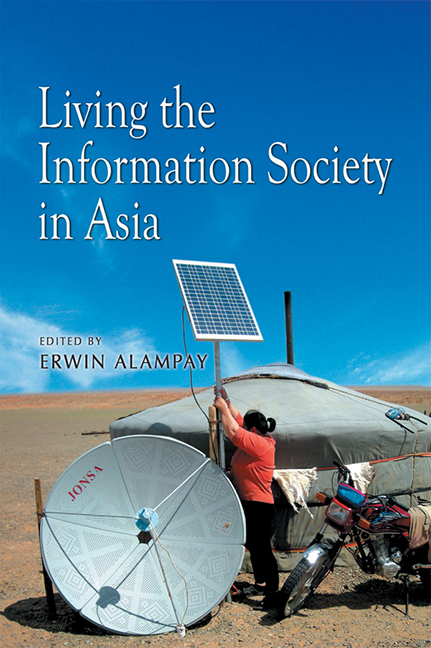Book contents
- Frontmatter
- Contents
- Foreword
- Preface
- List of Abbreviations
- Contributors
- Introduction: Perspectives of ICT Research in Asia
- 1 What Would Durkheim Have Thought? Living in (and with) the Information Society
- 2 What Is a Mobile Phone Relationship?
- 3 Technologies of Transformation: The End of the Social or the Birth of the Cyber Network?
- 4 Becoming Mobile in Contemporary Urban China: How Increasing ICT Usage Is Reformulating the Spatial Dimension of Sociability
- 5 Mobile Religiosity in Indonesia: Mobilized Islam, Islamized Mobility and the Potential of Islamic Techno Nationalism
- 6 Moral Panics and Mobile Phones: The Cultural Politics of New Media Modernity in India
- 7 Stories from e-Bario
- 8 Life and Death in the Chinese Informational City: The Challenges of Working-Class ICTs and the Information Have-less
- 9 Institutional Responses to GIS Adoption for RPTA in Local Governments
- 10 Customer Acquisition among Small and Informal Businesses in Urban India: Comparing Face-to-Face and Mediated Channels
- 11 The View from the Other Side: The Impact of Business Process Outsourcing on the Well-being and Identity of Filipino Call Centre Workers
- 12 Empowering Thai Homeworkers through ICTs
- Index
1 - What Would Durkheim Have Thought? Living in (and with) the Information Society
Published online by Cambridge University Press: 21 October 2015
- Frontmatter
- Contents
- Foreword
- Preface
- List of Abbreviations
- Contributors
- Introduction: Perspectives of ICT Research in Asia
- 1 What Would Durkheim Have Thought? Living in (and with) the Information Society
- 2 What Is a Mobile Phone Relationship?
- 3 Technologies of Transformation: The End of the Social or the Birth of the Cyber Network?
- 4 Becoming Mobile in Contemporary Urban China: How Increasing ICT Usage Is Reformulating the Spatial Dimension of Sociability
- 5 Mobile Religiosity in Indonesia: Mobilized Islam, Islamized Mobility and the Potential of Islamic Techno Nationalism
- 6 Moral Panics and Mobile Phones: The Cultural Politics of New Media Modernity in India
- 7 Stories from e-Bario
- 8 Life and Death in the Chinese Informational City: The Challenges of Working-Class ICTs and the Information Have-less
- 9 Institutional Responses to GIS Adoption for RPTA in Local Governments
- 10 Customer Acquisition among Small and Informal Businesses in Urban India: Comparing Face-to-Face and Mediated Channels
- 11 The View from the Other Side: The Impact of Business Process Outsourcing on the Well-being and Identity of Filipino Call Centre Workers
- 12 Empowering Thai Homeworkers through ICTs
- Index
Summary
INTRODUCTION
In this chapter I will discuss the interaction between mobile communication and society and I will consider the impact of mobile communication on social cohesion. This has been an issue that I have been thinking about for some time now. I have participated in various projects that have likewise considered issues associated with this (Ling 2004) and have written a book that delves into this issue at some length (Ling 2008).
I am going to start with a broader topic, however, the interaction between technology and society. This may seem vast and also somewhat clichéd. It is, after all, a very common theme for those of us who have taken an interest in this area.
Revolution, Evolution or What?
The interaction between technology and society is the core of sociology. The current discussion with regards to the role of technology in society is, in some ways, an updated version of the traditional sociological project.
When thinking about the founding of sociology, a theme that ran through the work of, for example, Weber, Durkheim, Tönnies, Simmel, Marx, Compt and the others, is the impact of industrialization on the social fabric. These scholars, each in their own way, dealt with this central issue. These early social scientists were confronted with the reformulation of major social institutions. If we think of a simple list of major institutions such as the family, the church, the city, education and working life, the industrial revolution (both the transition to steam and later, the transition to electrical production) witnessed dramatic changes in these institutions. The family has moved from being an extended multi-generational affair to today's nuclear Mum-Dad-and-the-kids form. The church lost much of its influence, the cities ballooned, education was professionalized and democratized, and we moved squarely into wage-based labour. The traditional gemeinschaft society was nearly completely transformed into gesellschaft society, to use the dichotomy suggested by Tönnies.
Today, when confronted with the new information and communication technologies (ICTs), we are, in some respects, also engaged in the same issue. There has been the introduction of a new technology into society. We, as social scientists, have the privilege and perhaps the responsibility of keeping an eye on it. What are the social impacts of ICT? It is important to try to understand how these technologies are being played out vis-à-vis the broader social situation.
- Type
- Chapter
- Information
- Living the Information Society in Asia , pp. 1 - 23Publisher: ISEAS–Yusof Ishak InstitutePrint publication year: 2009

